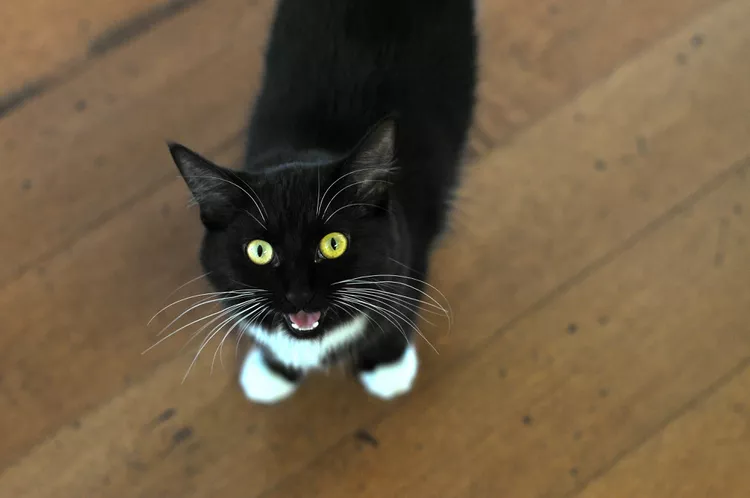Reasons Why Your Cat Meows at Night

Cats aren't usually as noisy as dogs, but that doesn't mean they don't vocalize. Cats will meow, scream, yowl, cry, and make other noises. Sometimes these noises are during the day in response to various stimuli, but many times they are at night when you are trying to sleep.
Why Won't Your Cat Sleep at Night?
Cats are naturally active and awake at night while you are trying to sleep. They might want to play, explore, eat, scratch, or get your attention and sometimes these actions are quite noisy and we wake up. Some cats are also especially lazy during the day. These cats will have a lot of energy to burn at night since they didn't expend much of it at all while you were awake.
Meowing for Attention at Night
If your cat is active, curious, and loves to play, then they may be waking you up at night with their meows seeking your attention. Cats will do many things to get attention, including scratching at your bedroom door, pawing at you, bumping into you, flopping down on the floor in front of you and, of course, meowing. If your cat is crying for your attention while you're trying to sleep, the best thing you can do in the moment is to ignore them. This is of course hard for some people, but if you give your cat attention while they are meowing for it, you will only be reinforcing the unwanted behavior. Even if you give your cat negative attention by yelling at it, you are still giving it attention. Earplugs may be your only solution until you can prevent the nightly meowing.
The next day, make sure you are wearing your cat out during the day by giving it toys to play with. Puzzle toys, feather wands, laser pointers, and battery powered chase toys are great solutions. There are even laser pointers on some pet cameras that can be controlled by you when you are away at work, so you can play with your cat even when you aren't home. By exhausting your cat and giving it all the attention it needs during the day, it will be less likely to want to meow at night.
Meowing for Food at Night
Did you forget to feed your cat? Cats often cry for food or treats and a hungry cat at night is not a quiet cat. You won't get much sleep if your cat is hungry, so make sure you feed it before going to bed. Do not get up in response to its cries at night, as this will only teach your cat that you will feed it when it meows at you. If you have a difficult work schedule or are concerned about forgetting to feed your cat, consider an automatic cat feeder that controls the meal time and amount of food your cat will get. This will guarantee a regular feeding schedule and your cat is less likely to associate you with getting fed. Also make sure that your cat always has access to clean water to eliminate thirst as a reason for nighttime activity and noise.
Meowing Because of Cognitive Dysfunction
Similar to people with dementia, cats can develop cognitive dysfunction that affects their ability to understand what's going on around them. It is not fully understood in cats, but we do know that elderly cats who appear confused and meow for no apparent reason often get worse at night. If you suspect your cat has some sort of cognitive dysfunction, get a definitive diagnosis and discuss treatment options with your veterinarian. Special foods and nutritional supplements may be recommended to help keep your cat's brain functioning as best as it can.
Meowing Because of Anxiety, Stress, Discomfort and Pain
Any health condition or situation that leads to anxiety, stress, discomfort or pain can make pet restless and more vocal than normal. Talk to your veterinarian if your cat develops behavioral changes or physical symptoms of illness that appear during the day or night.
Meowing Because of Eye Sight Issues or Deafness
If a cat cannot see or hear well, they may be scared or confused. At night your house is usually darker and quieter than it is during the day, and if your cat's eye sight is failing or they are deaf and can't see you, they may meow to receive help or comfort. Your cat may also not be aware that they are meowing loudly because they cannot hear themselves well. Eye sight can deteriorate with age and disease, as can hearing, so if your previously well-sighted and hearing-capable cat seems to be losing its senses, get it checked out by your veterinarian.